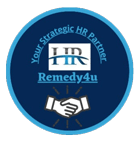Essential HR Compliance For Small Business Owners:
For small business owners, growth and profitability are top priorities. However, one often-overlooked element that plays a crucial role in business success is HR compliance. Ensuring compliance with human resources regulations not only helps avoid penalties but also builds a foundation for sustainable growth. In this article, we’ll explore key HR compliance requirements and how they are directly tied to your business's success.
Whether you're a small business owner or seeking HR consulting services, understanding these HR compliance steps can help streamline your business operations.
1. Business Registration & Licenses: Establishing Credibility and Growth Opportunities
Proper business registration and acquiring the necessary licenses are crucial first steps for any growing business. Whether it's MSME (Micro, Small, and Medium Enterprises) registration, GST registration, or a trade license, these compliance measures help in accessing opportunities like loans, subsidies, and partnerships.
For small businesses, ensuring all licensing requirements are met not only builds credibility but also enhances growth potential. Business owners that stay compliant with legal requirements find it easier to expand operations, attract bigger clients, and collaborate with established brands. Proper business registration and licensing lay the groundwork for a sustainable HR strategy, which aligns with HR consulting recommendations for growth.
2. Employee Provident Fund (EPF) & Employee State Insurance (ESI): Enhancing Employee Benefits and Retention
One of the key components of HR compliance is offering benefits like the Employee Provident Fund (EPF) and Employee State Insurance (ESI). These benefit programs ensure employees have access to social security, making your company an attractive employer in the marketplace.
For businesses with more than 20 employees, EPF is mandatory under the EPF Act of 1952, while ESI is required for employers with 10 or more employees. Offering these benefits can boost employee retention and improve workplace morale, ultimately leading to higher productivity. By complying with HR laws related to employee benefits, businesses can create a culture of trust and reliability—key factors that drive business growth.
3. Minimum Wages & Payment of Wages: Maintaining Compliance for a Happy Workforce
Ensuring your employees are paid fairly is one of the foundational aspects of HR compliance. The Minimum Wages Act, 1948, and Payment of Wages Act, 1936 are designed to ensure employees receive wages that meet government standards. Non-compliance can result in hefty fines and can damage your company’s reputation.
Paying fair wages is also critical for employee satisfaction. Happy employees are more productive and contribute positively to your company's growth. Timely payments not only avoid legal penalties but also foster a positive work environment. Aligning wage compliance with your overall HR strategy helps build a strong workforce, which is vital for business growth.
4. Tax Compliance: Transparency and Financial Health
Complying with tax regulations such as Income Tax, Goods and Services Tax (GST), and Tax Deducted at Source (TDS) is crucial for any business. Ensuring tax compliance is a key component of HR consulting services because it reflects the financial health of your business.
When your business is tax compliant, you create financial transparency, which is essential for attracting investments and securing loans for expansion. Tax compliance also provides insight into your financial metrics, helping you manage costs and revenues better, both of which are critical for HR planning and long-term business growth.
5. Sexual Harassment of Women at Workplace (POSH) Act: Creating a Safe Work Environment
One of the most important compliance requirements under HR laws is ensuring a safe and respectful workplace for employees. Under the Prevention of Sexual Harassment (POSH) Act, 2013, businesses with more than 10 employees are required to establish an Internal Complaints Committee (ICC) to address complaints and ensure a secure work environment.
Creating a safe and inclusive environment is essential for employee well-being and directly impacts workplace culture. A secure environment fosters employee engagement, enhances team productivity, and positively affects your business’s growth trajectory. HR consulting firms can help small business owners implement POSH guidelines effectively, ensuring a compliant and thriving workplace.


Comments